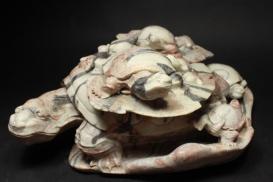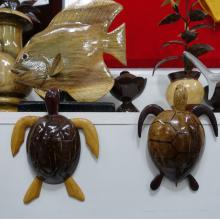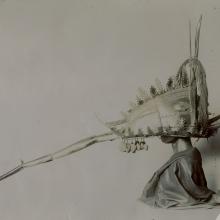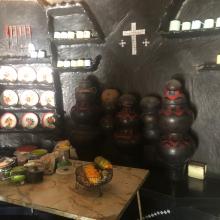The origin stories and cultural narratives of diverse peoples around the world are deeply entwined with principles that guide specific ways of knowing and acting in the universe. Among these, various turtle stories of peoples ranging from the Indo-Pacific Worlds to the Indigenous Americas have continued to provide images and information about the structure and order of the world. For some societies, relationships with turtles also form the foundation of knowledge systems that suggest important protocols and values of how to interact with other living beings, inanimate things, and ecosystems. Scientific knowledge of Chelonians (turtles and tortoises) and other animals in fields as wide-ranging as geology or conservation science have also benefited from plural knowledge systems that have repeatedly faced erasure. Since the seventeenth century, the expression “turtles all the way down” (TAWD) has gained salience in English language contexts, having been made increasingly distant from the authority of the turtle cosmologies from which they have been drawn. Today, “TAWD” is an idiomatic expression especially used to explain infinite regression. As a flexibly interpreted phrase, it can be used as either a neutral explanation or a dismissal of different knowledge systems.
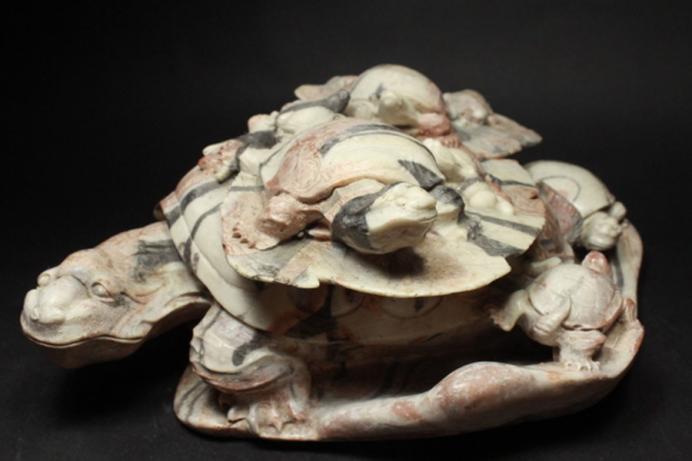
Stone turtle sculpture, China, S/N 3_2256. Courtesy The Live Turtle & Tortoise Museum, Singapore. Photographer: Hu Tsun Hao.
Our project collaborators historically examine the normalized imagery of the stacked turtles metaphor by inquiring into the roles of animal cosmologies in diverse cultures and how they have mattered to or for Indigenous knowledge and science. By focusing on multiple cultural contexts where turtle stories and knowledge have had lasting significance across different time periods, our comparative historical approach takes a step toward reclaiming “turtles all the way down.” The fractal stack of tortoises that extends from this description reflects two lines of historical questioning concerning language and material cultures, which together open up interrelated inquiries into anxieties concerning the location of authority about scientific knowledge or wisdom in human societies. "Reclaiming 'Turtles All the Way Down'" pursues research into turtle stories by combining Indigenous studies and histories of science, technology, and medicine to make historical and comparative understandings of turtle stories over time and around the world.
The following questions guide this investigation:
- How and why have turtle stories and/or lore had lasting significance for different knowledge communities historically, and relatedly, what tensions generate when different cultural and geographic understandings of worlds connected to the animal are brought into friction?
- How are humans' memories reconstructed and aided by the making, use, conservation, or unmaking of various chelonian things, be they artifacts or remains of actual turtles or tortoises, visual representations, or other objects made with their materials? Relatedly, how are those made to align with particular perspectives about history and belonging?
Different methods are used to engage with each of these questions. The first employs text-based analyses and oral histories to examine how multiple turtle and tortoise stories have operated in local languages and how they have also been appropriated into observers’ languages, metaphoric and otherwise. The second combines object analyses with oral history and archival methods in order to study Chelonian materials or Chelonian-inspired artifacts from the Indigenous Americas and Indo-Pacific Worlds comparatively and thus analyze how turtle stories have been materially made and maintained. Digital tools are additionally used to examine artifacts, visual materials, texts, and oral traditions of different sociohistorical contexts. These methods altogether facilitate historical understandings about how various knowledges that connect turtles with worlds translate into material and mundane activities that ultimately guide relationships among different things in the universe.
Who is part of Reclaiming "TAWD"?
“Reclaiming 'TAWD'” is being co-developed with Leah Lui-Chivizhe and in collaboration with scholars including Kyle Powys Whyte, Melissa Nelson, Vicente M. Diaz, Pratik Chakrabarti, Scott F. Gilbert, Kristina Buhrman, Marissa Petrou, John Mathew, Adrien DeSutter, and Clapperton Chakanetsa Mavhunga.
Recent Activities
This project coalesced during the pandemic as we considered what it meant to be in lockdown—isolated, and yet, connected. Between August 2020 and March 2021, we hosted a series of virtual monthly reading group meetings with scholars from different fields, including conservation scientists and anthropologists. In these meetings, we refined our individual and collective project ideas by reflecting upon the various sources and materials (including objects and images) and theoretical frameworks available to researchers and how to engage with stories and communities responsibly. Since 2022, we have begun to explore the significance of terrestrial and relational takes on cosmology while considering that these approaches in the history of science have predominantly dealt with the study of the universe and space. More specifically, we are collaborating with the “Visualization of the Heavens” Working Group and will contribute to the 2023–2024 Institute’s Colloquium season.
News & Upcoming
- Our Isis Focus section "Magnifying Insect Histories" was featured in the HSS newsletter, "Transactions of the IsisCB."
- Melissa Nelson participated in the "Approaching, Translating, and Engaging Cosmology" Roundtable at the Institute’s Colloquium on 16 April 2024, along with Francesca Rochberg and John Tresch. Please check this link for more information.
- In 2023, Leah Lui-Chivizhe received "highest commendations" in the New South Wales Australian History Prize for her book, Masked Histories: Turtle Shell Masks and Torres Strait Islander People. Congratulations, Leah!
- In 2023, Lisa Onaga gave a plenary talk entitled “Silk Craft: Locating Epistemic Heritage through Archipelagic Thinking” at the Käte Hamburger Kolleg event, "Turning Points in Reflections on Science and Technology: Toward Historicizing STS."
- We're looking forward to the upcoming departmental lecture series, "Manners of Reckoning," coordinated by Lakshmi Pradeep Rajeswary which will kick off in September 2024.
- Upcoming: We’re organizing a series of monthly reading group meetings! Please email lprajeswary@mpiwg-berlin.mpg.de for more information.
- Upcoming: We will host a roundtable panel of scholars working in and around the Asia-Pacific region entitled “Reckoning With Scientific and Intergenerational Knowledge” at the 2025 International Congress for the History of Science and Technology in New Zealand
Please check this page again for more updates.

